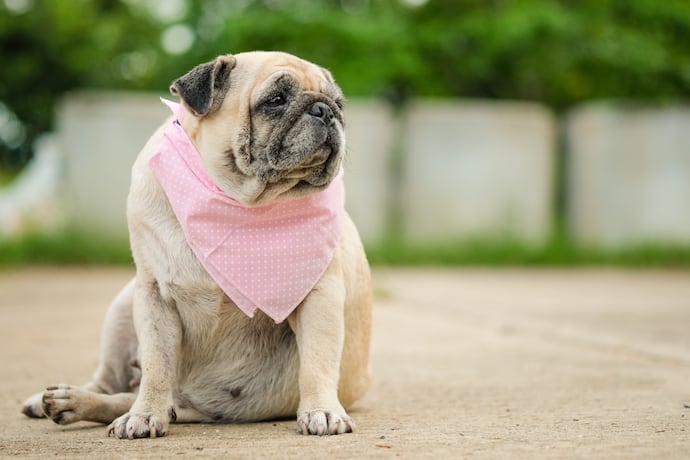Did you know that obesity is the most common nutritional disorder seen in cats and dogs? Many of us don’t even realise that our dog has become overweight as it often takes place gradually over time.
As much as we love to spoil our pets, that extra treat in the morning and the odd bowl of leftovers every other day can have serious and detrimental effects on your dogs health and well-being. Research shows that being as little as 20% overweight can greatly increase the risk of your dog developing serious health conditions such as diabetes mellitus, pancreatitis, arthritis and painful joint problems, urinary stones or heart disease.
Not only does carrying excess weight have a negative impact on your dog’s general wellbeing, happiness and overall quality of life, it can also significantly shorten their life expectancy compared to a healthy-weight pet.
WHAT CAUSES WEIGHT GAIN?
Weight gain is the result of an increase in body fat. This is usually caused by feeding too much or a decrease in exercise and in many cases it’s a combination of both. But there can be other contributing factors too, such as;
- AGE – Older dogs are less active, have less energy, and require fewer calories, which is why nutrition formulated for his age is vital to his weight and overall health.
- DESEXING STATUS – Desexed dogs have a decreased metabolism, meaning they require 30% less food overall than their un-desexed counterparts.
- OVERFEEDING – Dogs with unlimited access to food understandably eat more than they need — this includes table scraps and extra treats from family members.
- QUALITY OF FOOD – Many supermarket type commercial foods are loaded with salt and fat. This improves taste, which means your dog will usually love it, but it won’t love them back.
- BREED – Some dog breeds are typically more food motivated and less active than others making them more likely to gain weight.
- MEDICAL PROBLEMS – Weight gain can be associated with medical disorders that may require veterinary treatment.

SO WHAT CAN I DO?
Accepting that there is a problem and committing to getting your pet back to a healthy weight is step one. To understand your pets current condition, their goal weight and how to get there, we recommend booking an appointment with your vet. Weight loss should gradual and steady in order to be safe. Once you know your pet’s goal weight, there are a number of methods you can implement to help them get there.
- DIET – Proper nutrition plays a very important role in treating an overweight dog, speak to your vet about the best weight management diet for your pet. Use the correct feeding guide and measure your pets daily meals with a measuring cup or scales. Make sure to account for any treats, dental chews etc. in their daily feeds.
- EXERCISE – Promoting regular exercise will not only assist you in decreasing your pets weight, it will increase their overall happiness and quality of life.
- WEIGH INS – Regular weight checks will let you know whether you’re on the right path, allow you to adjust feeding amounts and also help to keep you motivated by showing you how far you and your pet have come. You are always welcome to pop in and use our scales for weight checks, no appointment needed.
- ACTIVITIES – As well as regular exercise, playing games or activities is a fun way to get the whole family involved in your pets weight loss journey.
- “Puppy Ping Pong” is a game that will not only get your dog moving but will also help to reinforce their recall! Have family members stand apart and take it in turns to call your dog to encourage them to run to you, reward the behaviour when they get to you with a small amount of boiled chicken breast, carrot or other healthy treat.
- “Find It” Is great for exercise and mental stimulation. Cut up some carrot or pumpkin into small pieces and throw them around your backyard. Your pet will be on an adventure lead by their nose to try and find the food you threw.
- TIPS AND TRICKS – Make swaps where you can e.g. try swapping your pets schmackos or pig ear for a carrot. Rather than letting your pet hoover their biscuits straight from a bowl, disperse their food over a large area or use a treat ball to make them work for it!
